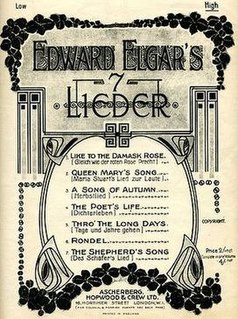The Pomp and Circumstance Marches, Op. 39, are a series of five marches for orchestra composed by Sir Edward Elgar. The first four were published between 1901 and 1907, when Elgar was in his forties; the fifth was published in 1930, a few years before his death; and a sixth, compiled posthumously from sketches, was published in 1956 and in 2005–2006. They include some of Elgar's best-known compositions.

Sir Henry Walford Davies was an English composer, organist, conductor and educator who held the title Master of the King's Music from 1934 until 1941.
"Pleading" is a poem written by Arthur L. Salmon, and set to music by the English composer Edward Elgar in 1908, as his Op.48.
Oh, soft was the song is a song with words by Gilbert Parker set to music by the English composer Edward Elgar in 1910, as his Op. 59, No. 3. It is the second and last verse of a poem At Sea which Parker published in Volume I of a series of poems called Embers. The Opus 59 songs were part of a song-cycle of six romantic songs by Parker that was never completed – Nos 1, 2 and 4 were never composed. The other songs were Was it some Golden Star? and Twilight. The songs were originally written with piano accompaniment, but this was later re-scored by the composer for full orchestra.
"The Language of Flowers" is an unpublished song from a poem by the American geologist and poet James Gates Percival, with music written by the English composer Edward Elgar when he was only fourteen years old.

Speak, Music! is a song written by the English composer Edward Elgar in 1901 as his Op.41, No.2.

The Torch is a song written by the English composer Edward Elgar in 1909 as his Op.60, No.1.

"The Wind at Dawn" is a poem written by Caroline Alice Roberts, and set to music by the English composer Edward Elgar in 1888.

”The Shepherd’s Song” is a song written by the English composer Edward Elgar in 1892. The words are by Barry Pain.
”Through the Long Days” is a song written by the English composer Edward Elgar in 1885 as his Op.16, No.2. The words are from a poem by the American writer and statesman John Hay.

"After" is a song written by the English composer Edward Elgar in 1895, as his Op. 31, No. 1, with the words from a poem by Philip Bourke Marston.

The Fringes of the Fleet is a booklet written in 1915 by Rudyard Kipling (1865–1936). The booklet contains essays and poems about nautical subjects in World War I.

Seven Lieder is a set of songs by the English composer Edward Elgar published together in 1907, by Ascherberg, Hopwood & Crew Ltd.

"In Moonlight" is a song with music written by the English composer Edward Elgar in 1904 to words from the poem "An Ariette for Music. To a Lady singing to her Accompaniment on the Guitar", by Percy Bysshe Shelley (1792-1822) and published in 1832.

Salut d'Amour (Liebesgruß), Op. 12, is a musical work composed by Edward Elgar in 1888, originally written for violin and piano.
Coronation Ode, Op. 44 is a work composed by Edward Elgar for soprano, alto, tenor and bass soloists, chorus and orchestra, with words by A. C. Benson.
The Concert Allegro, Op. 46 by Sir Edward Elgar is a piece of music for solo piano. It takes about 10 minutes to perform. It is the only piano work he wrote that was designed for concert performance. It is in the key of C major and was written in 1901, at the request of the pianist Fanny Davies.

Ian Venables is a British composer of art songs and chamber music.
This is a summary of 1901 in music in the United Kingdom.











